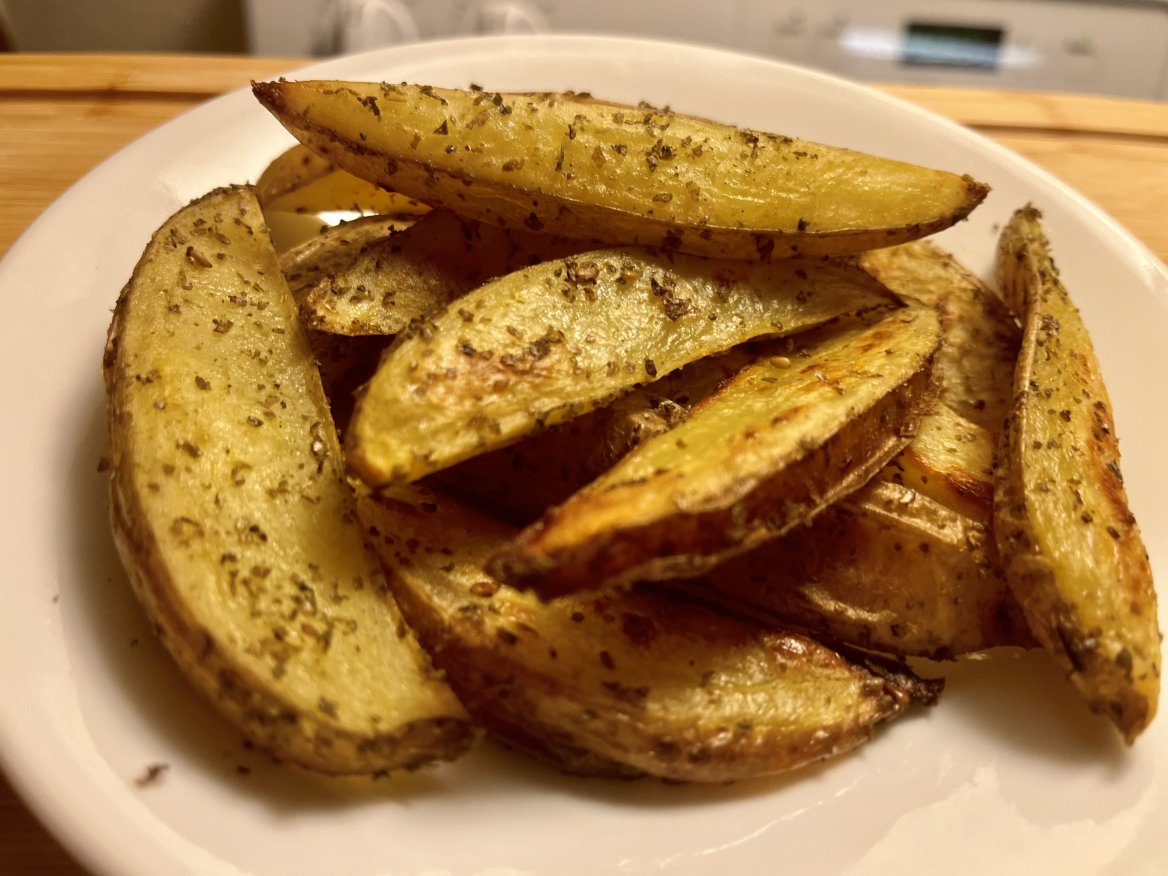Za’atar (زعتر ; pronounced “zAh-tar”) is an extremely popular spice blend in Arabic cooking and cultures. The word za’atar itself translates to “wild thyme” or “Syrian thyme,” which is a main ingredient in the blend. It’s also made with sesame, sumac, and oregano. This spice blend is used to season meats, dips, rices, breads, and much more. It’s popular for good reason- it’s very tasty and quite unlike anything else I have tried before. The flavor is very mild, earthy, and a bit nutty. There is no one correct way to make za’atar. I purchased mine online from Terranean, a company founded by Lebanese-American Tina Chamoun. If you’d like to make your own za’atar blend, try following this recipe.
Ingredients:
- 4 Medium/Large Golden Potatoes
- 1-3 tsp Za’atar Seasoning (to taste)
- Olive Oil
- Salt (to taste)
Instructions:
- Preheat your oven to 400°
- Fill a large bowl with cold water and some ice.
- Clean your potatoes well, or peel them if you’d like.
- Cut your potatoes into wedges or fries. (I went for chunky wedges, but I’ve also had za’atar on skinny stick fries and they were amazing!)
- As you cut your fries, add them to the bowl of cold water to soak for 20 mins. Soaking the fries removes excess starch and makes them cook better.
- After they soak, drain your fries and then lay them out in an even layer onto a clean dish towel and lay another clean towel on top. Press down for a few seconds, then leave them wrapped in towels to fully dry out, at least 30 mins. If the fries are cooked while still wet, they will not crisp up as much. Rinse out your large bowl and dry it off.
- Add your fries back into the large bowl along with 1-2 tsp olive oil and toss. *Note* If your bowl is not big enough to fit them all, you can season a portion of the fries at a time.
- Add your za’atar to the bowl along with a sprinkle of salt. Toss to evenly coat the fries.
- Once your fries are seasoned you can spread them out onto a baking sheet lined with parchment paper.
- Baking times will vary depending on the cut of your fries. Mine were large and thick so I let them cook for 50 minutes, but for thinner fries you can start with 25-30 minutes. Flip the fries over when they have 10-15 mins left to make sure they are evenly browned.
- Insert a fork into the fries to test whether or not they have finished cooking through. If the fries are still tough, they need more time in the oven.
- Once they are finished in the oven, serve immediately and enjoy!
A Story of Za’atar and Palestinian Food Sovereignty:
Wild thyme is native to Eurasia and Northern Africa, including the Middle Eastern lands currently under the illegal occupation of Israel. Za’atar has been a staple of the Palestinian diet for centuries. The Israeli Occypying Force (IOF), also known as the Israeli Defense Force, made the collection of wild thyme by Palestinians illegal in the late 1970s to prevent overharvesting. This contributed to the contention between these populations in the region. Palestinians were suddenly unable to harvest za’atar or other foods for their families or for their businesses, under threat of confiscation, disproportionate fines, or sometimes even brutalization. Israeli settlers and members of the IOF still regularly beat and imprison Palestinians for harvesting olives or za’atar outside their own homes- despite Israel itself establishing large and successful agricultural systems for growing both olives and za’atar industrially. Israeli settler-colonialism has limited millions of Palestinians’ rights. Articles Here, Here, Here.
Since October of 2024, the United Nations Office for the Coordination of Humanitarian Affairs (OCHA) has recorded “225 incidents involving settlers directly related to the olive harvest in 82 communities across the West Bank, the majority of which (171 incidents) resulted in casualties or property damage.” Israeli settlers also commit ecocide by regularly destroying Palestinians’ crops, orchards, and other wildlife and by bombing a portion of their lands without relent; between October 2023 and November 2024, Israel dropped over 85,000 tons of bombs on the Gaza Strip, whose coastline is only 24 miles long.
The removal of Palestinian food sovereignty in particular has had widespread and long-term negative impacts on Palestinians. Israel as an occupying force has full control over all water, livestock, foods and other goods, gas, and electricity in Palestine. The livelihoods of Palestinians have been challenged by Israel for decades before this latest stretch of humanitarian crises. This is an important piece of context in conversations about Middle Eastern foods, international politics, culture, and human morality.
Invitation:
You are invited to read this thesis paper by Kate Reynolds on the illegality of harvesting za’atar in Palestine, or to watch this short video for more information.
Human rights matter all over the world. The beloved late Pope Francis commented on the current aggression against Ukraine, Palestine and Lebanon, saying Israel in particular is using “immoral and disproportionate” violence. He also personally contacted Palestinian Christians for several months before his death, consistently sharing words of strength and compassion.
Americans have huge influence over the actions of not only our own government, but Israel’s too, due to the nature of democracy and the close connection between the two nations. So, go to your town hall, write a Letter to the Editor of your local newspaper, or call your representative- we all need to speak out for those who are suffering. This violence cannot be allowed to continue.





Post a Comment